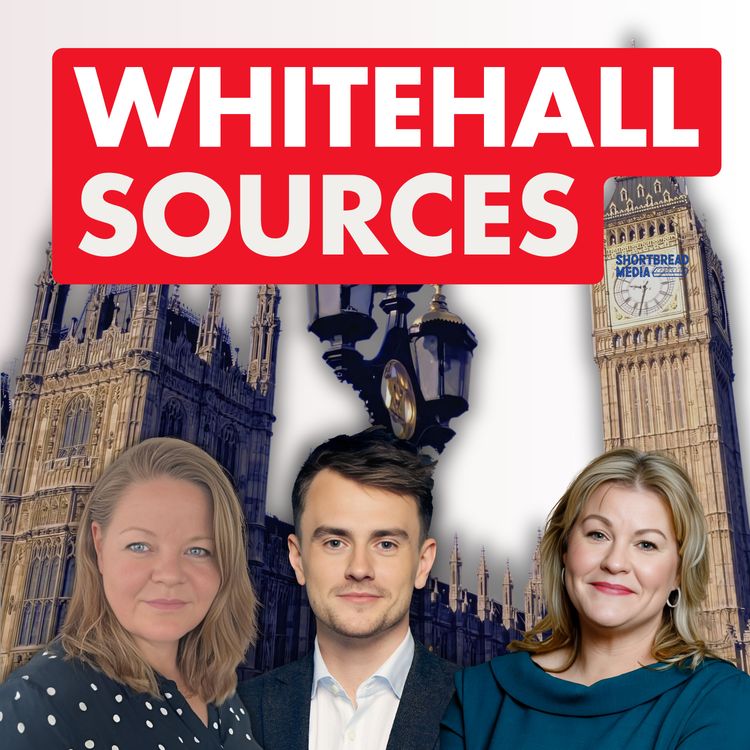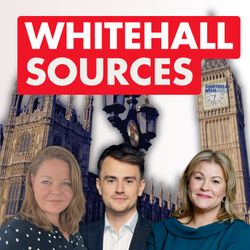Share

Whitehall Sources
Labour in the USA, Prisoners Released, The Budget
Season 3, Ep. 35
•
Calum Macdonald and Kirsty Buchanan discuss various pressing political issues in the UK, including prison overcrowding, the Labour Party's involvement in US elections, and the upcoming budget. Kirsty shares insights from her experience in the Ministry of Justice, emphasising the complexities of the criminal justice system and the need for reform. The conversation also touches on the political implications of Labour's actions and the fiscal strategies being employed by the government.
More episodes
View all episodes

44. Christmas Special: Political Chaos, Trump, Ukraine & 2026 Predictions
39:10||Season 4, Ep. 44The Whitehall Sources Christmas Special takes a hard look back at one of the most turbulent years in British and global politics — and asks what comes next.Calum Macdonald, former No.10 adviser Kirsty Buchanan and political strategist Jo Tanner unpack the defining moments of 2025:The Labour welfare rebellion that exposed Keir Starmer’s leadership weaknessesRachel Reeves’ emotional Commons moment and what it revealed about pressure at the topAngela Rayner, reshuffles, and why Starmer is being labelled an “unlucky general”Europe, Trump, Putin and the Alaska summit — and why the UK and EU look powerless on UkraineHas anything really changed in global politics despite the noise?Plus: 🎙️ Our favourite Whitehall Sources moments of the year 🔮 Bold predictions for 2026, including Keir Starmer’s future and Nigel Farage’s leadership of Reform UK 🎄 Festive politics, candid debate, and unfiltered analysisIf you want insider political analysis without the Westminster spin, this episode is essential listening.📩 Send us your 2026 predictions: WhatsApp: 0333 404 6507 Email: hello@whitehallsources.com🎧 New episodes every week — including throughout Christmas and New Year.
43. Keir Starmer Reset? Labour Rebellion, Jury Trials Backlash & Interest Rate Cuts
32:47||Season 4, Ep. 43Is Keir Starmer heading for another reset in January — and will it work?In this episode of Whitehall Sources, Calum Macdonald, former No.10 special adviser Kirsty Buchanan and political strategist Jo Tanner examine the growing pressure on the Labour leadership as 2026 looms.The panel breaks down:Why Labour MPs are rebelling over proposals to restrict jury trialsWhether Starmer has lost his political narrative — and public trustWhat the Bank of England’s interest rate cut to 3.75% really means for households and businessesWhy the courts backlog, assisted dying, and constitutional reform are becoming political flashpointsAnd whether Labour is drifting away from its manifesto promisesWith sharp analysis, blunt criticism, and a few festive laughs, this episode asks a simple question: Does Keir Starmer still know what he stands for — and does anyone else?🎧 New episodes of Whitehall Sources drop weekly throughout the festive period. 📌 Subscribe for insider political analysis from Westminster.
43. Anatomy of a Leak... and ECHR reform
44:26||Season 4, Ep. 43
42. Is Starmer Secretly Planning a New Brexit Deal?
45:47||Season 4, Ep. 42Brexit is back on the agenda — and this week’s Whitehall Sources dives deep. Former No10 adviser Kirsty Buchanan, political strategist Jo Tanner, and Calum Macdonald break down whether Keir Starmer is quietly preparing the UK for a new customs arrangement with the EU – and what that actually means.We analyse:🔹 Starmer’s recent speeches hinting at closer EU ties🔹 Whether Labour is shifting towards a customs union🔹 How “the” vs “a” customs union could decide Britain’s economic direction🔹 What the EU actually wants from any renegotiation🔹 The political danger from Reform UK and Nigel Farage🔹 Why Brexit sentiment could explode again if this returns to the headlinesPLUS: We take on David Lammy’s proposal to scrap jury trials for many serious offences to tackle the justice backlog. Jo brings her personal experience as a juror — including a shocking story about racism inside the jury room.Also on the pod: Christmas trees, Caribbean holidays, political communications failures, and the enduring madness of Brexit semantics.Subscribe for more insider Westminster analysis from Whitehall Sources.
41. UK Budget 2025 Fallout: “Chaos, Tax Pain & Political Survival”
48:14||Season 4, Ep. 41Two days after Rachel Reeves delivered her first budget, Calum Macdonald and former No.10 special adviser Kirsty Buchanan break down what really happened — from the OBR leak, to the tax rises, to the political strategy behind one of the most controversial fiscal events in years.Economist Simon French (Panmure Liberum) joins to assess: • Why the markets didn’t panic • Whether this budget really “clobbers working people” • Why business rates may spike for pubs & hospitality • Whether inflation could now fall faster • If the tax pain scheduled for 2027–2029 is even credibleWe also examine the biggest brewing storm: A £6 billion black hole in Special Educational Needs (SEND) funding and the government’s unclear plan to fill it.✨ Including discussion of welfare spending, Labour strategy, the markets, business rates, and parents’ fury over potential education cuts.If you enjoy behind-the-scenes Westminster insights and real economic analysis, subscribe to Whitehall Sources.
40. Behind the scenes on Budget Day
01:00:44||Season 4, Ep. 40Calum and Kirsty are joined by James Chapman, who was an adviser to Chancellor George Osborne; and Karim Palant who was an adviser to Shadow Chancellor Ed Balls, to take you behind the scenes of budget day. James tells us how the budget is even decided - including one measure that was kept secret from the Cabinet - they only found out about it when it was announced to the Commons. Plus, he discusses leaks that caused headaches for the government. Karim tells us about the room that opposition aides gather in to assemble messages and memos to run to the floor of the Commons chamber for the opposition response to be updated in real time. Kirsty wears her Number 10 hat - telling us that budget day is pretty relaxed for the Prime Minister - and wears her journalist hat to discuss the media briefing immediately after the budget. All of our guests were recorded independently - and every one of them mentioned the infamous pasty tax. Hear what they have to say about how budgets unravel. Email us anytime: hello@whitehallsources.com.First published 2023
39. A Survival Budget: The Preview
01:34:59||Season 4, Ep. 39Join us live from central London for an unmissable deep-dive into Rachel Reeves’ upcoming Budget — with business leaders, MPs and political strategists unpacking what’s really happening behind the scenes.Recorded at the Make UK headquarters and sponsored by Rud Pedersen, this Whitehall Sources Live special brings together an expert panel to explore the most turbulent pre-budget period in years.🔥 What we cover in this episode: – Why business and consumer confidence is collapsing – Why over half of UK companies have paused investment – The £25 billion tax question hanging over Rachel Reeves – Will Labour target businesses again after last year’s NI and wage rises? – The three types of political budgets explained (Reforming, Narrative & Survival) – Is the UK economy stuck in a “doom loop”? – Public sector productivity, NHS pressures & welfare reform – What business leaders want from the Budget (consistency, clarity & stability)🎙 Featuring: • Chris Curtis MP – Labour MP for Milton Keynes North • Dame Harriet Baldwin MP – Conservative MP & Shadow Business Minister • Ruth Sunderland – Award-winning business journalist • Lord Richard Harrington – Chair of Make UKThe panel debates everything from tax rises to foreign investment, business confidence, national insurance, public spending, and the political realities facing the Chancellor next week.If you care about the UK economy, manufacturing, tax policy, or the political dynamics defining Britain’s future — this episode is essential viewing.
38. Chaos inside Number 10 and the BBC
50:19||Season 4, Ep. 38In this episode of the Whitehall Sources podcast, Calum Macdonald Kirsty Buchanan and Jo Tanner analyse the latest news from Westminster. The discussion centres around the challenges facing Prime Minister Keir Starmer, including potential leadership challenges from within his party, and the implications of recent political manoeuvres. The episode also explores the controversy surrounding the BBC, particularly in light of recent editorial decisions and accusations of bias, as well as the threat of President Trump suing the corporation. The trio provide insights into the internal dynamics of the Labour Party, the role of media in politics, and the broader implications for governance and public trust.
37. PMQs Chaos, Migrant Sex Offender Release & Labour Budget Secrets
46:27||Season 4, Ep. 37Join the Whitehall Sources podcast as we dive deep into Westminster politics. This week, Calum, Kirsty, and Jo, with a special guest appearance from James Nation, ex-Special Advisor to Chancellor Rishi Sunak.We discuss:The shocking mistaken release of a migrant sex offender and the fallout at Prime Minister’s Questions (PMQs).David Lammy’s handling of the situation and the questions it raises about accountability in government.Behind-the-scenes insights from PMQs, including the “Rolls Royce” briefing operation and what might have gone wrong this week.Labour’s budget strategy, Rachel Reeves’ tax plans, manifesto pledges, and the political impact of potential income tax rises.The Office for Budget Responsibility (OBR), Treasury decision-making, and what ministers can and cannot do to influence forecasts.Unpacking the challenges of fuel duty, public spending, and the UK’s fiscal outlook ahead of the next budget.Whether you’re a political junkie, policy nerd, or just want insider analysis on Westminster chaos and the upcoming budget, this episode breaks down the biggest political stories of the week.